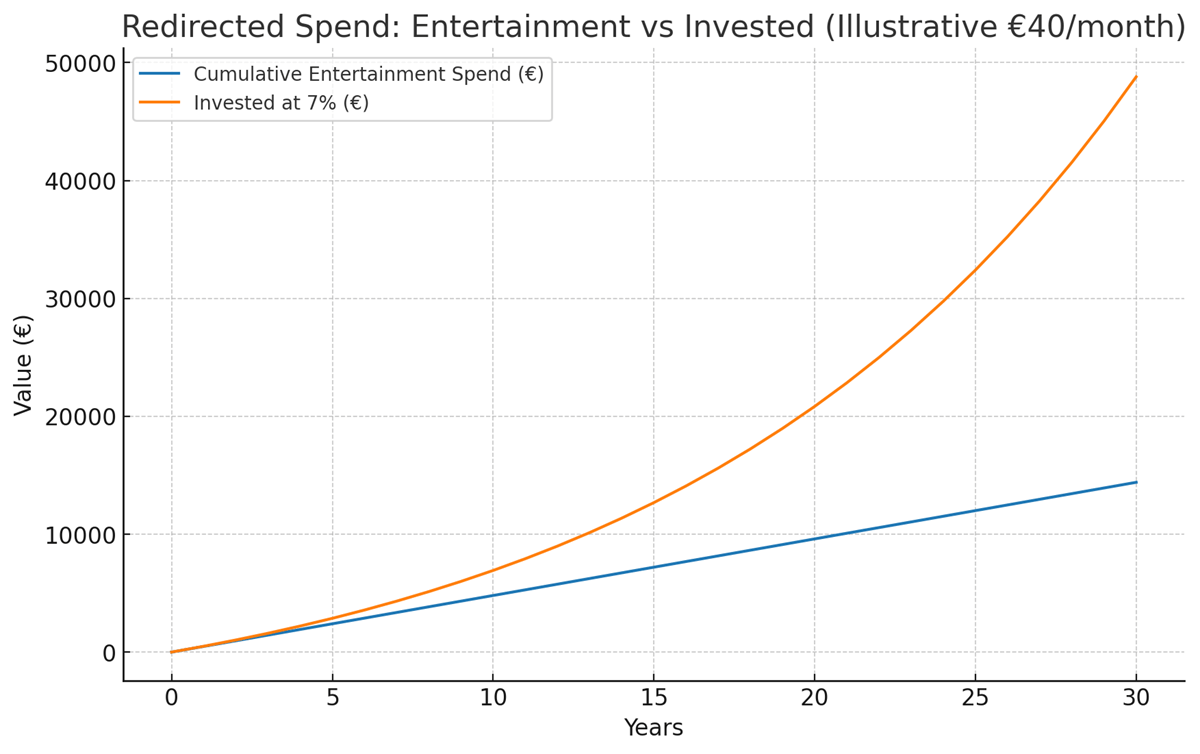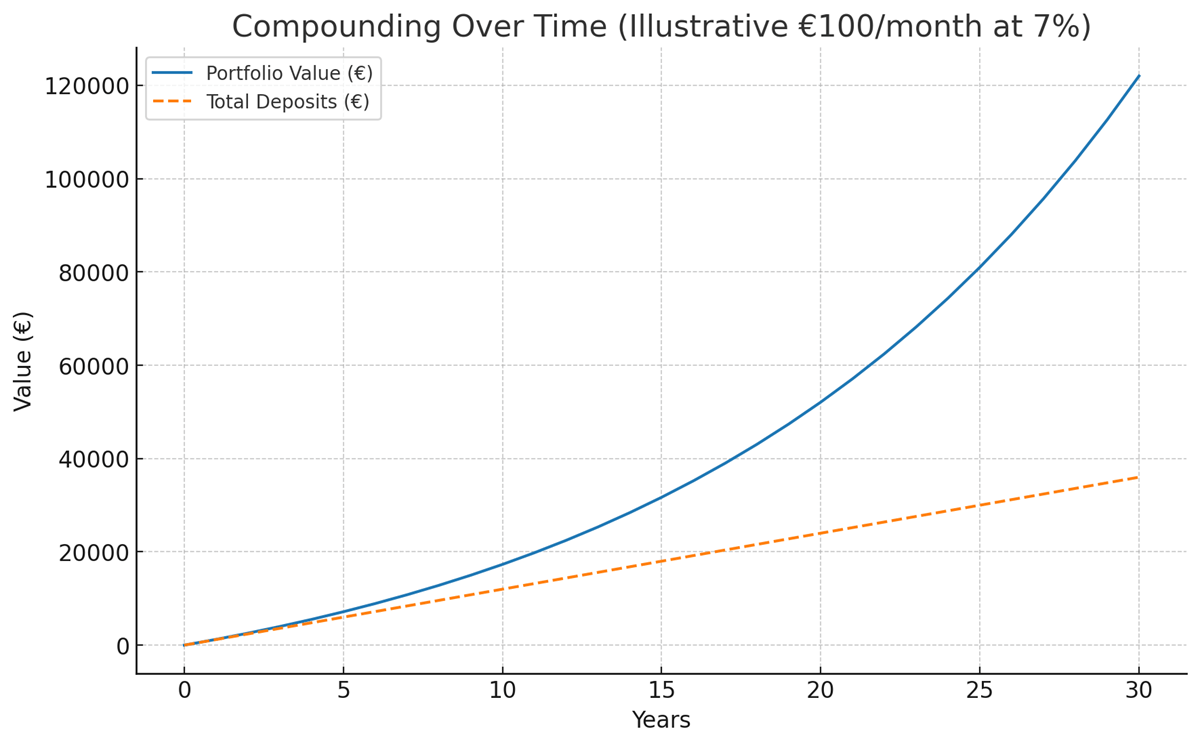Beyond the Jackpot: Why Investing Outperforms Lotteries for Real Wealth
Don’t Wait for the Jackpot — Save to Invest
Dave Ramsey, the American personal finance guru and radio host, once called the lottery ‘a tax on the poor’, a blunt reminder that what many see as hope is, in reality, a system designed to profit from desperation.
Record lottery jackpots often grab headlines, creating a powerful illusion of quick wealth. Across Europe, participation in lotteries is broad, and ticket sales are immense. For example, the United Kingdom sees around 30 million people participating in the National Lottery annually, with ticket sales reaching approximately £8.19 billion in 2022/23. Pan-European games like EuroMillions, which spans nine countries with jackpots capped at €250 million, and EuroJackpot, played in 19 countries with a €120 million cap, frequently reach their maximum payouts, leading to exciting reports of wins. Even regional lotteries, like the OPAP TZOKER in Cyprus-Greece, can see jackpots climb to significant figures, such as a recent record of ~€28.83 million.
However, the exhilarating nature of these headlines can be statistically misleading for life planning. The simple truth is that luck isn't a wealth strategy.
The Astronomical Odds: A Reality Check
The odds of winning a top lottery prize are astronomically low. Consider these figures:
EuroMillions jackpot (per line): 1 in 139,838,160
EuroJackpot jackpot (per line): 1 in 139,838,160
UK Lotto jackpot (6/59): 1 in 45,057,474
OPAP Tzoker jackpot (per ticket): 1 in 24,435,180
To put this into perspective, you are over 1,500 times more likely to be struck by lightning (an estimated 1 in 15,300 lifetime risk) than to win a major lottery jackpot. These odds do not improve with larger headlines or roll-downs.
The Entertainment Trap: Lotteries Are Not an Investment
Myth vs Fact
Myth | Fact |
“Lotteries are a clever way to try my luck.” | Lotteries have negative expected value; they are entertainment, not a wealth tool. |
“I need a lot of money to start.” | Save-to-invest relies on automation, diversification, and time—not large lump sums. |
“I’ll wait for the right time.” | Time in the market beats timing the market; start and stay consistent. |
Lotteries are a form of entertainment, not a wealth-building tool. They operate with a negative expected value, meaning that over time, players are expected to lose money. Headlines only spotlight the rare winner, not the millions of guaranteed losers. The true cost isn't just the ticket price; it's the missed compounding on every euro not invested.
If you enjoy the thrill, treat lottery tickets like a movie ticket: fun, affordable, strictly capped, and entirely separate from your financial plan.
The Disciplined Path: Your Real Jackpot is Time in the Market
Instead of chasing a windfall, the proven method for building wealth is a disciplined save-to-invest approach. This strategy relies on:
Automation: Setting up automated monthly transfers into your investment account.
Consistency: Starting and staying consistent, as time in the market beats timing the market.
Diversification: Owning a core, diversified portfolio.
Compounding: Allowing your returns to earn returns, quietly and relentlessly. This is your real jackpot.
Reinvestment: Reinvesting dividends.
Goal Alignment: Matching your plan to real goals like retirement, a home, education, or legacy.
You don’t need a large lump sum to start. Small, habitual contributions add up significantly over time.
What Redirecting "Lottery Spend" Can Do (Illustrative)
Imagine redirecting just €40 per month that might otherwise be spent on discretionary items like lottery tickets into an investment portfolio earning a 7% annualized return. This simple act can dramatically increase your investable savings rate, allowing compounding to work its magic.
Below is an illustrative comparison of spending €40/month on entertainment vs. investing it at 7%.

Even a modest €100 per month consistently contributed can show remarkable growth over decades due to compounding, far surpassing the total amount deposited. The chart below shows how a simple €100/month contribution compounds over decades at a 7% annualized return, compared to the straight-line of total deposits.

Behavior Over Brilliance: The Key to Success
Markets reward discipline, not luck. A calm, rules-based approach consistently outperforms impulsive, seat-of-the-pants decision-making. This means:
Keep a disciplined approach and avoid impulse buying and panic selling.
Trim and rebalance when allocations drift.
Ignore get-rich-quick pitches.
Quick FAQs
Is investing risky? Markets do fluctuate, but diversified portfolios, appropriate time horizons, and regular rebalancing are intelligent ways to manage risk. Lottery tickets, by design, offer negative expected value and do not manage risk.
Can I still play for fun? Absolutely, just ensure you cap your spending and keep it entirely separate from your core financial plan. Entertainment is fine, but your wealth plan should be non-negotiable.
How do I start if I’ve never invested? Begin as early as possible, establish a diversified core portfolio, and define clear goal timelines. Focus on consistency first; sophistication can come later.
The Takeaway: Own a Plan, Not a Dream
The path to financial freedom isn't found in a lottery drawing; it's built through consistent, disciplined investing. You don't need a windfall; you need time in the market. Redirect the energy spent dreaming of a jackpot into a save-to-invest routine that leverages the power of compounding.
Every day you delay investing is a missed opportunity—the best time to start was yesterday, the next best time is today. We build goal-aligned, diversified portfolios and disciplined strategies tailored to you. Ready to move from chance to serious investing? Contact us.
Important Disclaimers: Illustrations are for educational purposes only and do not represent guarantees of future results. Past performance is not indicative of future returns. This is a marketing communication and does not constitute investment advice. Investing involves risk; your capital is at risk.
.png)